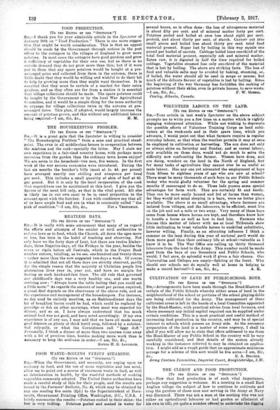MEATLESS DAYS.
ITo 7HE EDITOR OP THE " SPECTATOR."]
Rai:, It is really with some amusement that many of us regard the efforts and attempts of the secular or civil authorities to enforce laws as to food, which the Church, all down the ages more or less, has been in the habit of teaching and observing. Not only have we the forty days of Lent, but there are twelve Ember- days, three Rogation-days, all the Fridays in the year, besides the evens or vigils before all Festivals, which in the Prayer Book number sixteen, totalling, as we see, one hundred and twenty-three —rather more than the now suggested two days a week. Of course it is admitted that not all those days are strictly observed, partly for the simple reason that the majority of Christian people live abstemious lives year in, year out, and have no margin for fasting on such hard-and-fast lines. The old rule that governed our childhood's days was a very healthy one, and one worth reviving now : " Always leave the table feeling that you could eat a little more." As regards the amount of meat per person required, a great deal depends on the observance of the above rule, and on the experience and management of the housekeepers. For instance, no day need be entirely meatless, as on fleshless-dinner days the bit of breakfast bacon could be had, which could be replaced by porridge or fish on other mornings, when meat was expected for dinner, and so on. I have always understood that too much animal food was not good, and have acted accordingly. If my own experience is of any use, I may add that we have all made many good dinners on plenty of thick lentil soup, followed by a substan- tial roly-poly, or what the Cornishmen call " figgy duff." Personally, I think a dinner of more than two courses runs away with a lot of precious time, besides making more work than is necessary to keep the soul-case in order.—I am, Sir, &c.,
SOPHIA H. E. LANCMAID.






































 Previous page
Previous page